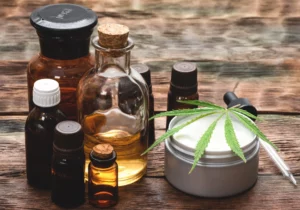Cannabis and alcohol are the two most popular recreational substances around, so it’s not unusual to see the two consumed together. Still, news about the way that cannabis and alcohol interact with each other has led many to advise against combining them. In fact, in California it’s now explicitly illegal to sell products that contain cannabis and alcohol together.
But new research is making experts think twice about banning this common combination. Scientists now believe that cannabis could have one very important effect when used with alcohol: preventing alcoholic liver disease (ALD). If enjoying a beer or cocktail is already part of your regular relaxation routine, adding cannabis just might help save you from the effects of ALD.
FOLLOW US ON FACEBOOK & INSTAGRAM
What Is Alcoholic Liver Disease?
ALD is a condition caused by excessive drinking for long periods of time. When alcohol is consumed it can have a damaging effect on the liver including increasing liver inflammation, building up fats in the organ and even scarring the liver. Over time, this can lead to increasingly serious damage and eventually death.
This tragic and preventable condition takes almost 20,000 lives a year in the U.S. alone and is the third-most common cause of liver transplants.
ALD is classified by four stages:
- Alcoholic fatty liver disease (steatosis): This is when fat deposits start to build up in the liver. It can happen in as little as a week and is usually reversible with alcohol abstinence.
- Alcoholic hepatitis (steatohepatitis): After many years of heavy drinking, the liver becomes chronically inflamed. This is also often reversible by abstaining from alcohol.
- Fibrosis: This stage is characterized by a buildup of certain proteins in the liver. It may be reversible if mild to moderate.
- Cirrhosis: When the liver is inflamed for long periods of time, loss of function and scarring occur. This damage is irreversible and life-threatening.
Additionally, these stages of ALD put drinkers at high risk for liver cancer.
Research Shows Cannabis Can Help Prevent ALD
In a surprising twist, it turns out that the disease caused by one popular recreational substance may be prevented by another.
Researchers were curious about cannabis and alcohol’s combined effect on the liver since it hadn’t been studied in depth. With increasing numbers turning to this combination, it was important to make sure cannabis wasn’t compounding alcohol’s negative effects. After all, many recreational substances seem to put stress on the liver.
But what researchers found was just the opposite. Users with the highest levels of cannabis use had much lower rates of ALD.
In one study, researchers looked at the four stages of ALD and liver cancer among 320,000 individuals with alcohol use disorder. They analyzed the data to see whether cannabis use had any effect on the different stages of ALD. And they found that cannabis consumers had significantly lower rates of ALD at all stages of the disease.
Specifically, alcohol drinkers who also consumed cannabis had the following reductions in ALD stages:
- 45% reduction in steatosis, or alcoholic fatty liver disease
- 40% reduction in steatohepatitis, or alcoholic hepatitis
- 55% reduction in alcoholic cirrhosis and fibrosis
- 75% reduction in hepatocellular carcinoma, or liver cancer
While any cannabis use seemed to play a protective role for the liver, those categorized as dependent cannabis users (those who consumed it the most) had the lowest rates of ALD. This suggests that more cannabis is better when it comes to protecting the liver from the deadly long-term effects of alcohol.
These results add to conclusions from a previous study, which found that the cannabinoid cannabidiol (CBD) use was tied to lower levels of ALD. This new research seems to suggest that cannabis in general, as well as CBD alone, is effective at reducing ALD.
Another important study shows that cannabis consumption is tied to lower levels of non-alcoholic fatty liver disease as well. So, cannabis may protect our livers in general, not just when drinking alcohol.
Still, since drinkers are at high risk for liver disease, they’re an especially vulnerable population that could benefit from adding cannabis into their routine. Switching out alcohol use for cannabis consumption is healthier for the liver, given what we know from the research. But if drinking is unavoidable, adding in cannabis could really help, too.
How Cannabis Helps Reduce ALD
There are many reasons why cannabis has such an incredible effect on the liver. But one of the main ways is through cannabis’s anti-inflammatory properties. Much of the damage sustained by the liver during the progress of ALD is a result of the long- term inflammation and swelling caused by alcohol consumption.
RELATED: CAN CANNABIS BE A HEALTHIER SUBSTITUTE FOR ALCOHOL?
Cannabis is known to calm inflammation, reduce swelling and lessen the damage inflammation causes. Those consuming both alcohol and cannabis are, in a way, canceling out one with the other. Alcohol increases inflammation, but then cannabis brings it back down. While this isn’t a foolproof method (remember that many alcoholics who consume cannabis will still get ALD), it definitely lowers the risks.
Other researchers say that cannabis helps by preventing the oxidative stress caused by alcohol. Alcohol can also weaken the body’s natural ability for autophagy—the process by which damaged or redundant cellular components are destroyed. Cannabis seems to increase autophagy, which may help the liver repair itself.
If you’re interested in consuming cannabis to help prevent or treat ALD, the best first step is to talk to a doctor with cannabis expertise. Your doctor can help go over your current conditions, and let you know what cannabis options are best suited to you.
Need to find a cannabis doctor? You can video-chat with HelloMD’s knowledgeable doctors today, from the comfort and privacy of your own home.
Photo credit: Toa Heftiba
If you’re new to cannabis and want to learn more, take a look at our Cannabis 101 post. HelloMD can help you get your medical marijuana recommendation; it’s easy, private and 100% online.






